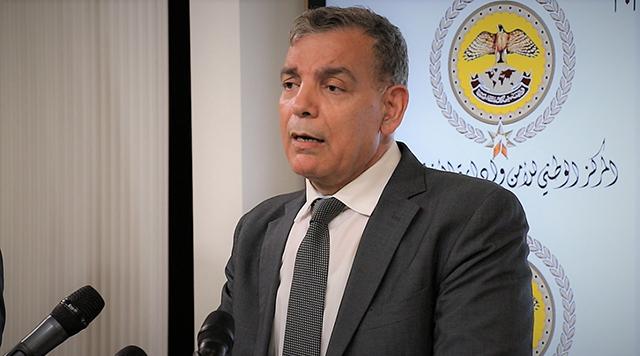- Local News
- Tue-2020-04-14 | 02:28 pm

During a joint press briefing with Minister of State for Media Affairs Amjad Adaileh at the National Centre for Security and Crisis Management, Jaber said that the new cases include an individual who contracted the virus from her mother and another person who was also infected through contact with a coronavirus patient.
The minister also announced 14 new recoveries in the Kingdom, including 10 recovered patients from Prince Hamzah Hospital.
He also noted that kidney dialysis patients who have visited public and private hospitals have undergone coronavirus testing, the cost of which was covered by the ministry.
Also speaking during the briefing, which was streamed live on Facebook, Adaileh said that during the upcoming days, a new defence order will be issued to support the institutions that have been affected economically by the curfew and to protect the workers in these facilities.
A set of decisions aimed at supporting daily wage workers will also be announced in the following days, he added.
Highlighting that a number of the Kingdom’s governorates are coronavirus-free, Adaileh pointed out that the government and the Jordan Armed Forces-Arab Army are considering the possibility of amending the curfew instructions in regions that have not reported any infections.
This includes imposing entry and exit bans on these regions, allowing economic activities to resume and opening businesses with a minimal number of workers, he said, adding that the government will share further details in the coming days.
Adaileh also said that priority in distributing bread subsidies will be given to the families that have been affected by the curfew and daily wage workers.
Restaurants that want to provide delivery services may apply for work authorisation through the website delivery.mota.jo, he said.
Highlighting His Majesty King Abdullah’s instructions to expand local production of pharmaceuticals and medical supplies for domestic consumption and for exporting purposes, enhance food and agricultural industries and maintain production sustainability, Adaileh said that Prime Minister Omar Razzaz decided to form four specialised teams including representatives from the public and private sectors, the military and security bodies.
The teams include the Higher Steering Committee, headed by the premier, which was formed to instruct technical committees on national priorities and approve the national production plan, as well as ensure the requirements for implementing the plan.
The teams also include the pharmaceutical manufacturing team, the food manufacturing team and the team for the manufacture of medical devices and sterilisers, he said, pointing out that these teams are tasked with identifying manufacturing priorities in the short and long terms.
The teams will also determine the volume of expected domestic consumption of products and those designated for export, as well as identify required production inputs and classify them according to their local availability or their import needs, the Jordan News Agency, Petra, added.
The committees aim to "transform the challenges that Jordan is facing amid the coronavirus crisis into opportunities” to enhance and expand national products and increase their quality, Petra reported.
The committees will also make use of Jordan's regional ties to enter into partnerships in order to expand existing factories, open new ones and market them in the region.










